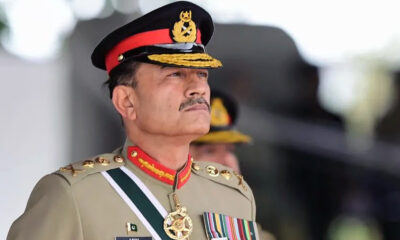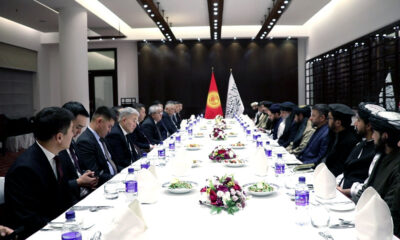Latest News
OIC chief says he will ‘pursue dialogue’ with IEA and int’l community

The head of the Organization of Islamic Cooperation said on Tuesday that the 48th Session of the OIC Council of Foreign Ministers meeting will tackle a number of issues and that the organization will address the situation in Afghanistan.
Speaking during the opening session of the meeting, in Islamabad, the Secretary-General of the OIC, Hissein Brahim Taha, also said that foreign ministers would discuss the political and security situation in Afghanistan with the Islamic Emirate of Afghanistan (IEA).
In his address to delegates, Taha said: “I will pursue dialogue for peace, security and development in Afghanistan with de facto authorities and international partners.”
Saudi Arabia’s Foreign Minister Prince Faisal bin Farhan also commented on Afghanistan during the opening session and said: “We call for more efforts to help the brotherly Afghan people and we call on Afghans to help themselves by ensuring that Afghan lands are not used as a haven for extremist groups and respect for human rights, including Women’s right to education.”
Pakistan’s Prime Minister Imran Khan meanwhile gave the opening speech at the two-day meeting and said the OIC needs to encourage the Afghan people and include them in the international community.
He said he believed the “people of Afghanistan are strong enough to evolve and go in the right direction.”
Imran Khan also said no other people had suffered as much as Afghans but noted that for the first time in over 40 years, there was no conflict in the country.
“The only danger now is through the sanctions [imposed on Afghanistan] and non-recognition”, which could cause a humanitarian crisis, he said.
Imran Khan stated that it was “extremely important” to stabilize Afghanistan because it was the “only way we are going to be able to stop international terrorism from Afghan soil”.
“Let’s not be delusional that some other country can come in and fight terrorism through drones. The only way is a stable Afghanistan government that can take care of terrorism.
“Anyone who knows the Afghan character should be cautioned, please do not push the people of Afghanistan where they feel their sovereignty is being threatened.”
The meeting, however, is taking place in the midst of Imran Khan’s toughest political phase as he is facing a no-confidence motion.
Nearly two dozen lawmakers of his own Pakistan Tehreek-e-Insaf party have turned against him in the past week. The session for a vote on the motion has been called on 25 March.
Afghanistan has sent a delegation to Islamabad for the meeting but Pakistan’s Dawn News reported that Afghan Foreign Minister Amir Khan Muttaqi was not present.
According to Dawn News, another IEA official, Muhammad Akbar Azeemi, is leading the Afghan delegation.
Latest News
Afghanistan signs 30-year deal for marble mining in Daikundi

The Ministry of Mines and Petroleum of Afghanistan has signed a 30-year agreement with a private company to extract marble in Daikundi province.
Under the contract, the company will invest AFN 283 million in exploring and mining marble at the “Mesh-Uliya” site, spanning 16.74 square kilometers in central Daikundi.
Hedayatullah Badri, Minister of Mines and Petroleum, stated that the marble will be processed domestically before being exported abroad. He added that the Mesh-Uliya project is expected to create around 200 jobs, and the company is committed to supporting local communities through social initiatives.
Economic experts highlight that such investments, especially those focusing on domestic processing, are crucial for job creation, boosting exports, and strengthening the national economy. Analysts further note that the project will improve local infrastructure, expand social services, and enhance the economic and social well-being of Daikundi residents.
Since the return of the Islamic Emirate to power, efforts to develop Afghanistan’s mining sector have intensified, with multiple contracts signed in areas including cement, copper, iron, and lapis lazuli, involving both domestic and international companies.
Latest News
Passenger bus veers off Salang Highway, leaving 5 dead, dozens injured
Latest News
Major fire in Mandawi Kabul market contained, extensive losses prevented
Local shopkeepers said the fire broke out around 4 a.m.

The Ministry of Interior reported that personnel from the General Directorate of Firefighting and Emergency Response successfully prevented the further spread of a fire at Mandawi market on Kabul early Sunday morning.
Abdul Mateen Qani, spokesperson for the ministry, said that the fire destroyed 10 storage facilities and 8 shops. He added that initial losses are estimated at around $700,000, but timely action by firefighting personnel saved property worth approximately $2.2 million.
Qani explained that the fire was caused by an electrical short circuit. He praised the rapid and effective containment operations, which prevented more extensive damage.
Local shopkeepers said the fire broke out around 4 a.m.
-

 International Sports5 days ago
International Sports5 days agoIPL 2026: Teams take shape after auction as franchises balance star power and depth
-

 International Sports5 days ago
International Sports5 days agoILT20: Abu Dhabi Knight Riders end Desert Vipers’ unbeaten run in dramatic one-run win
-

 Latest News3 days ago
Latest News3 days agoAfghan border forces prevent illegal entry of hundreds into Iran
-

 Regional5 days ago
Regional5 days agoPakistan’s military chief Asim Munir in spotlight over Trump’s Gaza plan
-

 Latest News2 days ago
Latest News2 days agoPakistan summons Afghan diplomat over deadly attack in North Waziristan
-

 Business5 days ago
Business5 days agoMahirood Customs leads Iran’s exports to Afghanistan
-

 World5 days ago
World5 days agoTrump adds seven countries, including Syria, to full travel ban list
-

 Latest News5 days ago
Latest News5 days agoAfghanistan, Kyrgyzstan discuss expanding trade and economic cooperation

























